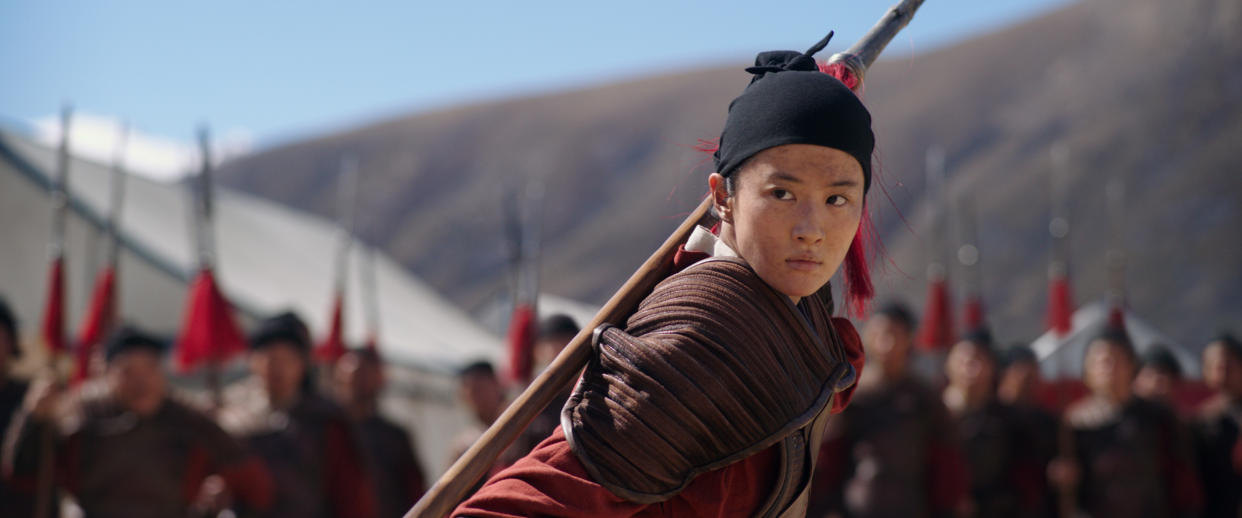Calls to #BoycottMulan grow even as the Disney movie enjoys a successful streaming launch

Originally intended to be the latest in Walt Disney’s long line of successful animated-to-live-action blockbusters, Niki Caro’s reimagined version of Mulan is instead a test case for a whole new model of Mouse House distribution. After the coronavirus pandemic repeatedly delayed the movie’s theatrical premiere, Disney decided to bypass multiplexes altogether and released the film on its streaming service, Disney+, as a “Premier Access” title for a $29.99 price tag on top of the usual subscription fee.
Based on initial reports, the studio’s gamble seems to have paid off: According to app download research firm, Sensor Tower, the number of Disney+ downloads increased 68% after Mulan debuted on September 4. For the record, that’s below the 73% spike that happened after the filmed version of Lin-Manuel Miranda’s Hamilton launched on Disney+ (without the Premier Access fee) earlier this summer. But it still confirms that there’s a massive captive audience that’s hungry for high-profile Disney releases, perhaps giving the studio extra incentive to make Marvel’s highly-anticipated Black Widow the next Disney+ Premier Access title.
Even as Disney+ downloads increase, though, a social media-driven #BoycottMulan campaign is also gaining ground online. The most vocal critics of the film are based in Asian territories like Hong Kong, Taiwan and Thailand and are calling attention to a myriad of behind-the-scenes issues surrounding the film, which is based on an ancient Chinese legend and was made with an eye towards the country’s lucrative moviegoing market. Unlike in the U.S., Mulan will play in Chinese theaters — which have largely reopened after the initial wave of the pandemic — starting September 11.
The first embers of the current controversy were stoked well before the film’s Disney+ debut. In August 2019, Mulan’s star, Liu Yifei, generated online outrage when she spoke up in support for the Hong Kong police force as they clashed with local pro-democracy protestors. Hong Kong-based activist Joshua Wong took to Twitter over the weekend to remind people of the Chinese American actress’s previous comments at a time when the territory’s relationship with China is growing increasingly strained.
This film is released today. But because Disney kowtows to Beijing, and because Liu Yifei openly and proudly endorses police brutality in Hong Kong, I urge everyone who believes in human rights to #BoycottMulan. https://t.co/utmP1tIWNa
— Joshua Wong 黃之鋒 😷 (@joshuawongcf) September 4, 2020
Liu isn't a victim somehow caught in the geopolitical crossfire. Neither is she an icon of feminism if she ignores the suffering of female protesters. She's instead an icon of authoritarianism willfully betraying the values Hollywood purports to champion. https://t.co/xL5iAWYb5V
— Joshua Wong 黃之鋒 😷 (@joshuawongcf) September 4, 2020
Same goes for Donnie Yen, another outspoken admirer of the Hong Kong police. I, too, urge everyone who believes in racial justice to #BoycottMulan. https://t.co/lsEnnzF1oz
— Joshua Wong 黃之鋒 😷 (@joshuawongcf) September 4, 2020
Hi everyone, she supports authoritarian violence against pro-democracy protesters in #HongKong ?? https://t.co/poAfTJoZdk
— Joshua Wong 黃之鋒 😷 (@joshuawongcf) September 5, 2020
The #BoycottMulan campaign gained additional momentum when critics noted that portions of the film were shot in China’s Xinjiang province, where human rights abuses against the country’s Uyghur Muslim population are alleged to be taking place. Eight government organizations in that region received a mention in the “Special Thanks” section of Mulan’s closing credits, among them the public security bureau in Turpan, which has reportedly been linked to internment camps in the autonomous region where almost one million Uyghurs are currently detained. China insists that the camps exist purely to address security and economic concerns, but activists are quick to point to reports of serious abuses committed by authorities against the minority population.
Mulan specifically thank the publicity department of CPC Xinjiang uyghur autonomous region committee in the credits.
You know, the place where the cultural genocide is happening.
They filmed extensively in Xinjiang, which the subtitles call “Northwest China”#BoycottMulan pic.twitter.com/mba3oMYDvV— Jeannette Ng 吳志麗 (@jeannette_ng) September 7, 2020
Mulan thanks Turpan Bureau of Public Security because it was filmed in Turpan in 2018, the peak of re-education campaign. How many thousands of Uyghur were put into camps by Turpan Bureau of Public Security when filming Mulan there? https://t.co/yX0xssPnKW
— Shawn Zhang (@shawnwzhang) September 7, 2020
“Disney, in other words, worked with regions [#Xinjiang, #China] where genocide [against #Uyghurs] is occurring, and thanked government departments that are helping to carry it out.”@Disney is so disgraceful!#BoycottMulan https://t.co/C8oh2RPZEP
— Uyghur American Association (@Uyghur_American) September 7, 2020
Well
Mulan does not only support #HKPoliceBrutality ,but also tyranny suppressing #Uyghurs
It has further strengthened why we should #BoycottMulan https://t.co/GPhnJ5u5Nf— A Star In Dark Night (@Silence21240183) September 8, 2020
One more reason for not watching #mulan , not only the main actress is a violence lover who support #HongKongPoliceTerrorism to murder #hongkongers, but also show support to susppress #uyghurs humanrights. What wrong with this movie. What an offense to real mulan. #BoycottMulan pic.twitter.com/seBO4BLXoQ
— zozozoie (@zozozoie3) September 8, 2020
Disney has yet to respond to the most recent accusations by the #BoycottMulan campaign. The continued online backlash also hasn’t appeared to seriously impact the film’s target audience in the U.S. In a press release provided to Yahoo Entertainment, the streaming company, Reelgood, noted that Mulan was the long weekend’s most-streamed release among its 2 million subscribers.

Mulan is currently streaming on Disney+.
Read more from Yahoo Entertainment:

